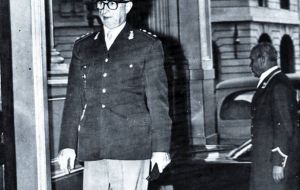MercoPress. South Atlantic News Agency
Falklands: the Argentine military planned invasion during World War II
 Benjamin Rattenbach, finally wrote about the consequences of an Argentine military invasion of the Falklands
Benjamin Rattenbach, finally wrote about the consequences of an Argentine military invasion of the Falklands It was 26 September 1941, Nazi Germany consolidated the siege on Stalingrad, America had yet to suffer Pearl Harbor and declare war on the Axis and Britain was suffocated under the pounding of German bombs and at sea losing tens of thousands of vital shipping.
That same day in Buenos Aires an Argentine naval officer, Captain Ernesto Villanueva presented a paper titled “Army and Navy cooperation. Occupation of the Malvinas Islands”, a detailed operation to militarily recover the South Atlantic archipelago occupied by the British.
So reads a piece published in the Ushuaia daily Diario del Fin del Mundo (End of the world journal), in the Memory lane section, credited to Bernardo Veksler, and recalling events of September 1941: “This happened in our region: a plan to recover the Malvinas militarily was presented”
The plan to be considered at the Naval War School assessed the international stage of World War II and the resources it involved.
Captain Villanueva “believed that Great Britain was too occupied in other world theatres as to address the luck of a few small colonial islands” (Juan B. Yofre; Malvinas, the documented history).
The plan was set out in 34 typed pages and its mission was ”to restitute an archipelago that belongs to the country (Argentina), and which its strategic situation is of vital significance for the maritime defense of the nation“.
With this purpose the plan was to land at Uranie Bay, at Berkley Sound, and at Cox Bay establishing ”an operational basis at Port Louis, until the operation could move with certainty on to Port Stanley (Puerto Argentino)“.
The plan discarded the use of the air force and stated: ”taking control of Port Stanley with Army and Navy landing troops, operating in a surprise action, with the early dawn lights, from Uraine Bay, protecting the landing with vessels and aircraft from the Fleet, destroying the defense batteries with air-naval forces operating from Deseado...“
The task force would be made up of ”a battalion of Marines distributed in two battleships, two heavy cruisers, a light cruiser, twelve torpedo boats, a tanker and nine tracking vessels“. To this would be added another 750 members from the Army which would have the main task, ”taking control of Port Stanley“.
Since it was a joint operation, criticism was the responsibility of Lieutenant Colonel Benjamín Rattenbach and it was categorical: the 'coup' in itself did not offer much difficulties. What was really difficult was what came after: keeping the Islands against a reconquest attempt from the British”.
That the 'Memory lane' piece published in the End of the world journal.
But that is not the end of the story, since Rattenbach, decades later and as a senior officer and much respected retired Lieutenant General was commissioned with two other officers (Navy and Air Force) to undertake a full report on the Malvinas war of 1982 which ended in a disastrous surrender and shame for the Argentine armed forces, which effectively had invaded the Falklands in April that year and were expelled 74 days later by a Task Force sent by Margaret Thatcher.
Officially it was known as the “Commission for the analysis and evaluation of political and military strategic responsibilities in the South Atlantic conflict”.
Its conclusions were later known as the lapidary 'Rattenbach report', which was only made public a year ago.




Top Comments
Disclaimer & comment rules-

-

-

Read all commentsCowards then and cowards now.
Nov 14th, 2013 - 08:04 am 0This strikes me as another example of how immature Argentina is compared to other nations. They planned to take advantage of WW2 to steal land by conquest. Just as Hitler tried to take all of Europe.
Nov 14th, 2013 - 09:44 am 0The parallels don't end there as Argentina also engaged in genocide to steal land from the Amerindians, something that they've not yet be held to account for, but will eventually. There will be a reckoning, because you cannot commit crimes against humanity like this and not pay for it. The Nazis were overwhelmed and their leaders hanged. Sadly the people that killed the indians are now dead, but the state of Argentina can be made to compensate the true owners of Patagonia, the people they still treat as second class citizens because of the colour of their skin.
I saw an Argentine film last night and it brought home to me how much Argentina is a third world country. Unlike their neighbours, they don't respect human rights, they don't respect basic laws let alone international law. Why should we continue to trade with a country that does not even believe in settling their debts and would rather default to get something for nothing.
......... its strategic situation is of vital significance for the maritime defense of the nation“.
Nov 14th, 2013 - 09:47 am 0How can the Falklands be 'vital' to the maritime defence of Argentina? They are right down at the southernmost tip of the country! What sort of attack could have been launched on the country from the Falklands in 1941?
The military top brass of Argentina must have been deluded to think (or to try to make anyone else think) that the taking of the Falklands would somehow make the continental land mass of Argentina a safer place. Maybe someone reminded them how stupid this justification would have looked.
The shame is that the 1982 junta didn't read the conclusion of that 1941 report before they tried to take the Islands ......they would have saved themselves a lot of bother and thousands of lives.
Commenting for this story is now closed.
If you have a Facebook account, become a fan and comment on our Facebook Page!